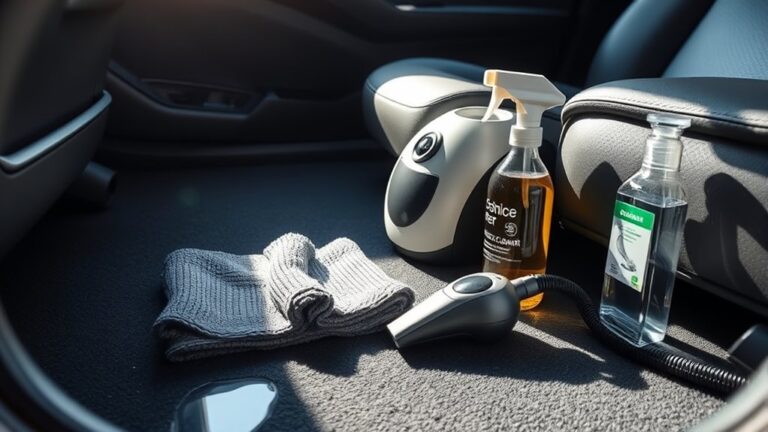If your dog is rubbing his butt on the floor, it usually means he’s uncomfortable. This scooting can be caused by impacted or irritated anal glands, parasites like fleas or worms, allergies, or poor hygiene. Sometimes, dietary issues or skin infections play a role too. Behavioral factors such as boredom or anxiety might also contribute. If the behavior persists, it’s important to understand the potential causes and find effective solutions to ease your dog’s discomfort.
Common Causes of Butt Scooting in Dogs

Although it might seem amusing at first, when your dog scoots its butt on the sol, it usually signals discomfort or irritation. Butt scooting is a common dog behavior that often indicates underlying issues you’ll want to address promptly. Common causes include itchy skin from allergies or parasites like fleas, which can cause significant irritation. Another frequent reason is impacted or irritated anal glands, but we’ll explore that in detail later. Additionally, your dog might scoot due to dirt or debris stuck around the rear, causing discomfort. Recognizing this behavior as a sign of distress rather than just a quirky habit helps you respond with care. By understanding these causes, you empower yourself to keep your dog comfortable and free from unnecessary suffering.
Understanding Anal Gland Issues
You might not realize it, but your dog’s anal glands play an important role in their health. When these glands get impacted or infected, your dog may scoot to relieve discomfort. Knowing the signs and treatment options can help you keep your pup comfortable and healthy.
Anal Gland Function
Anal glands play an essential role in your dog’s digestive and communication systems. These small sacs, located just inside the anus on either side, are part of your dog’s unique anal gland anatomy. They produce a strong-smelling fluid that dogs naturally release during defecation or moments of stress, serving as a scent marker to communicate with other dogs. Sometimes, these glands don’t empty on their own, which is where anal gland expression comes in—a manual process either done by you or a vet to help relieve discomfort. Understanding this function helps you appreciate why your dog might rub his butt on the floor. It’s a natural mechanism signaling that those glands need attention, ensuring your furry friend stays comfortable and free to roam without irritation.
Signs of Impaction
When those glands don’t empty properly, your dog may start showing signs of discomfort that are easy to notice if you know what to look for. Common impaction symptoms include frequent scooting or rubbing their butt on the floor, licking or biting the area excessively, and a noticeable foul odor. You might also see swelling or redness near the anus, and your dog could seem restless or uncomfortable when sitting. These signs indicate that your dog’s anal glands are impacted, which can affect their overall dog health if left untreated. Recognizing these symptoms early lets you take steps to help your dog find relief and maintain their freedom from discomfort. Staying observant is key to supporting your dog’s well-being and preventing more serious issues down the line.
Treatment Options
Although it might seem unpleasant, addressing your dog’s gland issues promptly is crucial to prevent discomfort and infection. You can try some home remedies like adding fiber to their diet to encourage natural expression of the anal glands. Regular exercise also helps maintain healthy digestion, reducing impaction risks. However, if your dog continues scooting or shows signs of pain, veterinary treatments become necessary. A vet can manually express the glands safely and prescribe antibiotics or anti-inflammatory medications if there’s infection. In severe or recurrent cases, surgical options might be discussed. Remember, while home remedies support your dog’s comfort, consulting a professional guarantees proper care and prevents complications. Taking timely action helps your dog stay free from discomfort and keeps their tail wagging happily.
The Role of Parasites in Itchy Discomfort
You might not realize that common parasites like fleas, ticks, and worms can cause intense itching around your dog’s rear, prompting that uncomfortable scooting behavior. These parasites irritate the skin and sometimes lead to infections, making your dog desperate for relief. Understanding how to prevent and treat these parasites is key to keeping your furry friend comfortable and itch-free.
Common Parasite Types
Several common parasites can cause your dog to feel intense itching, leading them to rub their butts on the floor. Intestinal worms, like tapeworms and roundworms, often irritate the anal area, making your dog uncomfortable. These worms can be picked up from contaminated soil or other animals, so regular vet checks are essential. Another frequent culprit is a flea infestation. Fleas bite and cause allergic reactions, which can make your dog’s skin around the tail and rear end extremely itchy. You might notice tiny black specks or actual fleas moving in your dog’s fur. Understanding these parasites helps you take quick, effective action to free your dog from discomfort and keep them feeling their best.
How Parasites Cause Itchiness
When parasites invade your dog’s body, they trigger a range of reactions that lead to intense itching and discomfort. Parasite transmission often occurs through contact with contaminated environments or other animals, introducing these unwelcome guests to your dog’s skin or digestive tract. Once established, parasites like fleas or worms irritate tissue, causing inflammation and an allergic response that results in persistent itchiness. You’ll notice your dog rubbing or scooting their butt on the floor as they search for itch relief. This behavior is your dog’s way of trying to soothe irritated nerves and remove the parasites or their eggs. Understanding how parasites cause itchiness helps you empathize with your dog’s discomfort and recognize the urgency of addressing the issue to restore their comfort and freedom from irritation.
Parasite Prevention Methods
Although parasite-related itching can be frustrating for both you and your dog, effective prevention methods can greatly reduce the risk of infestation and discomfort. To keep your furry friend free from parasites, regular veterinary advice is essential. Your vet can recommend appropriate treatments and check-ups tailored to your dog’s lifestyle. Incorporating natural remedies, such as diatomaceous earth or herbal supplements, can support parasite control but should never replace professional guidance. Maintaining cleanliness in your dog’s environment and ensuring they avoid contaminated areas also helps prevent infestations. By combining vet-approved treatments with natural options and good hygiene, you can protect your dog from the itchy discomfort parasites cause, allowing both of you to enjoy freedom and peace of mind.
How Allergies Can Lead to Butt Scooting
If your dog is scooting its butt on the floor, allergies might be the hidden culprit causing discomfort. Allergic reactions can inflame the skin around the anal area, making your dog feel itchy and irritated. Environmental triggers like pollen, dust mites, or certain grasses often provoke these reactions. When your dog encounters these allergens, the resulting inflammation can lead to swelling or itchiness that prompts scooting as a way to find relief. Understanding this connection is key to addressing the root cause rather than just the symptom. By identifying and minimizing exposure to environmental triggers, you can help your dog regain comfort and freedom from constant irritation. If the problem persists, consulting your vet for allergy testing and treatment options is the best step forward.
Impact of Poor Grooming and Hygiene

Since your dog’s comfort depends heavily on proper grooming, neglecting this essential care can lead to issues that cause butt scooting. Poor hygiene practices can result in matting, irritation, or infections around the anal area, prompting your dog to rub its butt on the floor to find relief. Implementing effective grooming techniques is vital to prevent discomfort.
Consider these key grooming and hygiene tips:
- Regularly trim hair around the anal region to avoid debris buildup.
- Clean the area gently with pet-safe wipes to maintain cleanliness.
- Check for signs of irritation, swelling, or parasites during grooming sessions.
- Bathe your dog appropriately to keep skin healthy without over-drying.
When Dietary Problems Affect Your Dog’s Comfort
Whenever your dog experiences dietary imbalances or sensitivities, it can lead to digestive discomfort that causes them to rub their butt on the floor. Sudden dietary changes may upset their system, triggering irritation or inflammation around the anal area. Food allergies are another common culprit, causing itching and swelling that your dog tries to relieve by scooting. If you notice this behavior after introducing new food or treats, it’s worth considering an allergy or intolerance. To help your dog find relief, you might need to adjust their diet carefully, avoiding known allergens and consulting your vet for guidance. By addressing dietary problems promptly, you not only ease your dog’s discomfort but also support their overall freedom to enjoy daily life without persistent irritation.
Identifying Skin Infections and Irritations

How can you tell if your dog’s scooting is due to a skin infection or irritation? Watch closely for infection symptoms and signs of skin irritation around the tail and anus. These clues help you address the problem quickly, giving your dog relief and freedom from discomfort.
Look for these signs:
Watch for redness, swelling, persistent licking, odor, discharge, hair loss, or scabs near your dog’s tail and anus.
- Redness or swelling near the affected area
- Persistent scratching or licking beyond normal grooming
- Unpleasant odor or discharge suggesting infection
- Hair loss or scabs indicating irritation or scratching damage
If you notice these infection symptoms, it’s essential to consult your vet for proper diagnosis and treatment. Early attention can prevent worsening discomfort and help your dog regain comfort and freedom.
Behavioral Reasons Behind Butt Scooting
Although medical issues often cause butt scooting, behavioral factors can also play a role. You might notice your dog scooting as a way to relieve boredom, seek attention, or express anxiety. Recognizing these behavioral signs helps you address the root cause without unnecessary stress. Here’s a quick look at common behavioral reasons behind butt scooting:
| Behavioral Reason | Description |
|---|---|
| Boredom | Dog scoots to entertain itself |
| Recherche d'attention | Scooting to get your focus |
| Anxiety | Displays stress through scooting |
| Habit | Learned behavior, repeated over time |
Understanding these signs lets you give your dog the freedom to express themselves while gently steering them away from uncomfortable habits.
When to See a Veterinarian for Butt Scooting
Why might your dog be scooting more than usual, and when should you worry enough to consult a veterinarian? If your dog’s butt scooting becomes frequent or intense, it could signal discomfort requiring professional care. Don’t wait to seek veterinary consultation if you notice:
Frequent or intense scooting may signal discomfort—consult a veterinarian promptly to ensure your dog’s well-being.
- Persistent scooting lasting more than a day or two
- Signs of pain, bleeding, or swelling around the anus
- Excessive licking or biting of the rear area
- Changes in your dog’s bathroom habits or appetite
Addressing these signs promptly guarantees your dog’s comfort and freedom from potential infections or impactions. Remember, timely veterinary consultation can prevent complications and help your furry friend get back to feeling great. Your dog’s well-being and happiness are worth every bit of attention you give.




